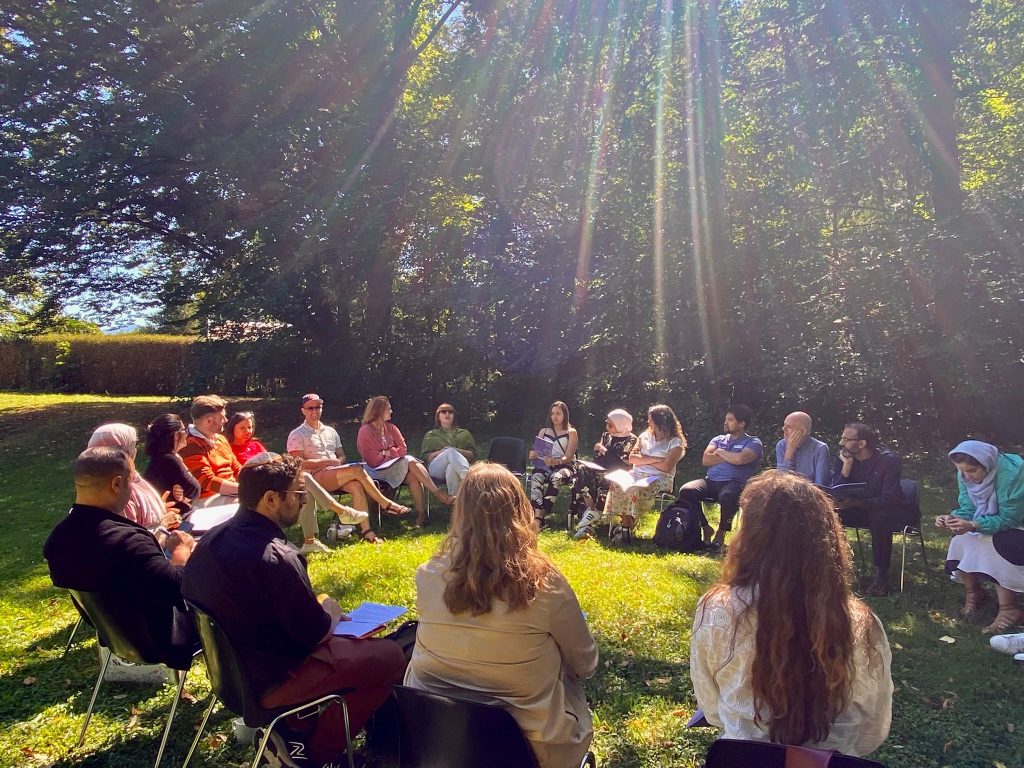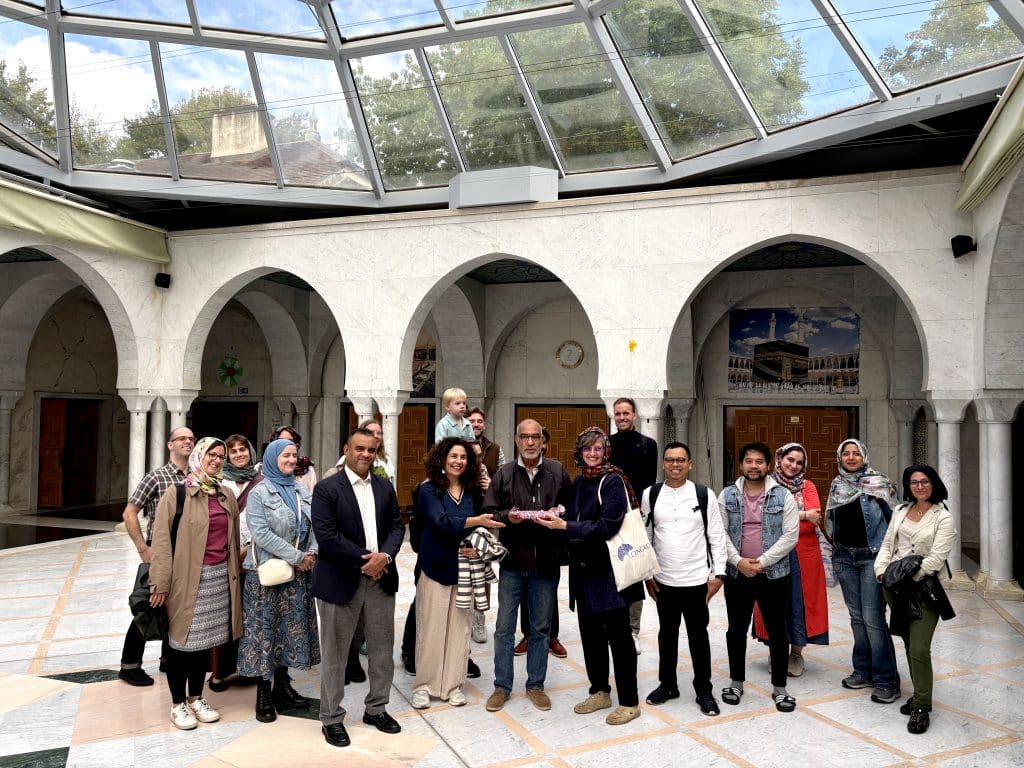Working to improve mutual understanding between the Middle East and the West
Working to improve mutual understanding between the Middle East and the West
No products in the basket.
In the aftermath of the deadly attack on the Manchester synagogue, Chief Rabbi Ephraim Mirvis stressed in a BBC interview that the attack was not only aimed against Jews but also threatened the shared values of society. He underscored the danger of harmful language, noting that when dehumanising or hateful rhetoric goes unchecked it can create a climate in which physical violence is legitimised. GINGKO knew of that danger and decided to tackle it head on when we chose ‘Productive Encounters With Polemical Texts’ as the theme of our Interfaith Fellowship Retreat this year.
‘Religious difference is not a weakness to be papered over but a strength to be acknowledged,’ according to Benjamin Kamine, one of the three co-convenors of the Retreat. ‘Often, previous generations of dialogue focused on commonalities. This was important when it was not always clear what we had in common at all, but the limitations of that approach have been evident in the last few years when our differences have not only caught people off-guard but derailed entire dialogue projects. The best solution to polarization is to speak openly and honestly about our differences. It allows us to meet them head on and gives us a chance of bridging them. We may also find that our differences are less striking than we imagine if we put them on the table. Keeping them off the table keeps us in our worst imaginations of the other.’
Ben therefore first convened a panel of six scholars from the World Council of Churches, the International Center for Comparative Theology and Social Issues at the University of Bonn, the Jewish Theological Seminary, the Rossing Center for Education and Dialogue, Humboldt University of Berlin, Al Azhar University and Together-We-Thrive. The panel discussed a selection of polemical texts, eventually whittling them down to nine, three from each from the Abrahamic faith traditions, including passages from Holy Scripture and texts from interpretive traditions which delegitimise and dehumanise the other, wounding words which are spoken in all-too-familiar prayers, preached from pulpits and minbars, or recited in liturgies. Embarrassing, hurtful, divisive and difficult texts.
And then GINGKO brought together 18 scholars – students and clerics from four continents – at Château de Bossey, the home of the Ecumenical Institute, to see whether there could ever be a constructive encounter with polemical texts, to test methods to counteract this dehumanising or hateful rhetoric, and to work towards a polemic-mitigating toolkit.
It was an amazing experiment, unique and urgent as recent events in Manchester show. It was an experiment in which we were ready to adapt the tried methodologies to meet the challenges we encountered along the way. An experiment in which we changed the parameters and the setting to create a safe space for all. An experiment in which we met not as representatives of certain communities, but as individuals. Did it work?
‘Can an encounter with polemical texts ever be productive?’ asked Professor Klaus von Stosch at the beginning of his keynote address and concluded that ‘Polemical Texts can only become productive within a concrete confessional context; as a Christian, I can only witness how they can become productive for Christians.‘ This was confirmed by the comparative analysis of the data collected in the pre- and post-Retreat survey of the impact of the days on the participants. After the Retreat, the number of participants reporting that they felt more confident in their knowledge of their own faith increased by 14 percent. There was also a 23 percent increase in respondents who reported feeling confident in their knowledge of an Abrahamic religion other than their own. This data also confirms the personal observation of Rick Sopher, the Retreat’s guest speaker, who believed that his study of ‘What the Qur’an Really Says about Jews, the Bible and the Holy Land’ made him “a better Jew”.
In a context of mistrust and misconceptions, GINGKO’s mission is to work to improve mutual understanding between the wider Middle East and the West. For that reason, we bring people together for transformative interfaith and intercultural encounters. Did this year’s Interfaith Fellowship Retreat accomplish this mission? Did it improve mutual understanding? Was it therefore a “productive encounter”?
‘We looked at difficult, polemical texts. They are very tough to hear,’ wrote Julie Siddiqi, another of the convenors and a GINGKO Trustee. ‘No one does that. But we did it! It was hard at times, intense feelings were generated but we held the space, together, and that meant people benefitted and were better for it, however tough it may have felt at the time.’
According to one of the Muslim GINGKO Fellows, it was both humbling and enriching to join brothers and sisters from the Jewish and Christian traditions in grappling with texts that, to some, may seem polemical or divisive. ‘Rather than shy away from them, we entered into dialogue with honesty and reverence, guided by the conviction that scripture must be a means to understanding, not a weapon of separation,’ Asmaa Elzieny said. ‘Over four days, in lectures and seminars, in quiet reflection and open conversation, everywhere and even around the table, we journeyed from unfamiliarity to friendship.’ Elzieny said that the gathering allowed people to glimpse the possibility of coexistence shaped by respect and compassion. ‘For Muslims, this is no departure from faith but its very heart,’ she said, ‘the Qur’an calls us to justice, mercy, and dialogue, and in Bossey, those calls found living expression.’
Prof. Angeliki Ziaka, WCC programme executive on Interreligious Dialogue and Cooperation, which accompanied the preparation and realisation of the GINGKO 2025 Interfaith Fellowship Retreat, stated that ‘the gathering went beyond usual norms by bringing together young scholars and religious leaders experienced in interfaith contexts. Participants not only discussed polemical texts and difficult themes but also shared personal and national experiences in a spirit of cooperation, seeking answers to today’s pressing challenges that are moving religion from the margins to the centre of political developments. The retreat highlighted the power of interreligious engagement, both among committed members of faith communities and those working alongside them for peace and reconciliation, offering hope for the future and a commitment to continue the dialogue,’ she concluded.
After the Retreat, there was an increase in the number of participants feeling ‘filled with some hope’ when thinking about relations between Christians, Muslims and Jews. Reflecting on their experience of the Retreat, one participant noted ‘This time felt transformational – really, markedly different from a lot of IRD work I’ve done previously.
Remembering the wrap-up exercise facilitated by Dr Brian Leathard, Julie Siddiqi recalls that ‘we asked everyone to share for two minutes what they are grateful for, what was challenging, and what they are taking away. People spoke about feeling like their life had purpose for the first time, how it was the first time they had really expressed their emotions among other academics, how they have made new friends and truly appreciated the bonds made through the week and so much more. We heard from those who admitted to being cynical and unsure this would work at all but had been well and truly converted to our approach and thinking differently by the end of the week!’
‘During the retreat, you experienced moments where ‘an Iranian sat next to an Israeli’ or a rabbi next to a priest.’ This observation of the WCC-interviewer prompted the following question to the convenors and the organisers: ‘What was the most striking personal experience for you from these encounters, and what does it teach?’
‘For me,’ said Barbara Schwepcke, GINGKO’s CEO and Trustee, ‘the image I will never forget was that of a Muslim scholar from Iran comforting a secular scholar from Israel, two women united by the pain caused by the actions of men who use the texts we were discussing to justify violence against “the Other”. What does it teach me? That I have to redouble GINGKO’s efforts to counter this dehumanisation of the Other, and shout at the top of my voice: When religion turns men into murderers, God weeps.’

